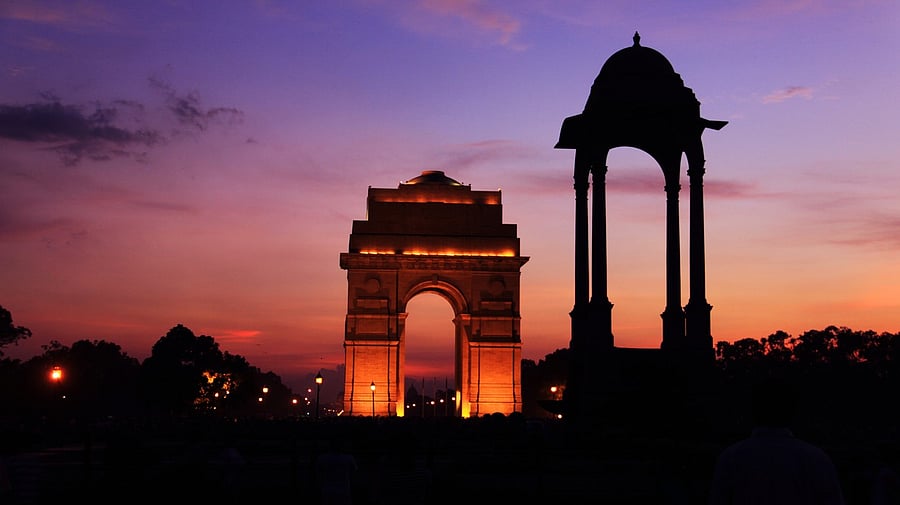
Representative image of Delhi.
Credit: iStock Photo
For the colonial masters, there were several reasons for shifting British India’s capital from Kolkata (then Calcutta) to Delhi. Among them, the burgeoning troubles following the splitting of Bengal were a key factor necessitating the speedy shifting.
The British laid the foundation stone for a new Delhi in 1911, and two decades later, the new capital city stood in all its magnificence.
The partition saw lakhs walking into Delhi with anxieties about the future in their minds and almost nothing in their hands. Post-independence, as India settled into a coherent nation, millions flocked into ‘Indraprastha’ from the length and breadth of the country to build their lives and nation block by block.
And they continue to do so. At least 63.40 lakh of 1.67 crore people counted in Delhi during the 2011 Census belonged to other states, not counting those who return to their homes in neighbouring states after work every day. “If one had a choice, would they really choose to live here?” as writer Kushwant Singh wrote once, is a question, but left unanswered by prospective rulers.
Political cacophony, or as Dilliwalas call it, tu-tu mein-mein, is making screaming headlines as the capital is heading to an election and the ‘gaali’ (abuses) season is all set to become harsher this winter. Prime Minister Narendra Modi will continue his AAP as AAPda (disaster) coinage while BJP’s principal rival, Arvind Kejriwal, would keep repeating AAP’s promises.
In the melee, voters too forget to question those seeking their mandate. While affordable health, education, housing, power, and water should top the agenda, the discourse in Delhi does not centre around them as fundamental rights of a citizen. Leaders of all hues, eager to distract voters, project them as ‘freebies.’
Breathing in Delhi has become a daily challenge, with the city’s air remaining polluted for most of the year. Rapid urbanisation, increasing vehicular emissions, and dust from rising construction activities and industries contribute to Delhi’s air becoming unbreathable even on a normal day. Diwali and winter months see the usual blame game over crackers and stubble burning.
Discussions and debates recede once Diwali is over and the intensity of stubble burning decreases. The government would blame meteorological conditions as the “driving force” in the pollution crisis, which is true to an extent, but the Supreme Court reminds them, “If it is monitored even with half of the intensity that is required, we wouldn’t reach this situation.” In the blame game, this issue dies a neglected death while respiratory illnesses rise.
Only months ago, a young boy and two girls drowned in the basement of a coaching centre for civil service exams after severe waterlogging following heavy rains. They wanted to be part of the famed Indian bureaucracy, but the dreams were shattered as a callous system led officers and politicians to fail to find solutions for a problem that was troubling the capital for years.
This issue too remains under the carpet this election season. The same is the case with disposing of garbage or burgeoning parking woes.
Rising crime too escapes the attention of the mainstream. AAP raised the issue in the last quarter of 2024, but it ended up as a blame game. One may talk about RJD losing power in Bihar and the Samajwadi Party getting defeated in Uttar Pradesh over law and order issues but not in Delhi. Gangs rise, snatchers run, and vehicle thieves flee.
Slums are disappearing fast as demolition drives intensify. But where are the slum dwellers going? While new apartment complexes for a few hundred are inaugurated, an NGO Housing and Land Rights Network estimates that at least three lakh people are still staying in the open without shelter. At the same time, the city is getting more congested.
Another issue that appears to be escaping the attention of politicians and policy makers is the rising rents, which have pushed essential workers like housemaids, ‘rickshawala,’ and students migrating to Delhi to the brink. They can’t find affordable accommodation. A recent study revealed a 70% rise in rents over two years, with property dealers, many of them local politicians or with links to leaders, jacking up rents for profit.
These days, it seems you need a tragedy to create ripples in Delhi. Earlier, a protest by anganwadi workers, a students’ group, or anyone else could capture attention. Parliament marches and rallies in
Ramlila Maidan sent shivers down the power structures.
A dissenting populace is the strength of a democracy, but in Delhi, police barricades, if not bulldozers, and shut Metro stations stonewall protesters from seeking the attention of those in power.
As a fresh election comes beckoning the capital, the leaders need to be reminded of what the 18th-century Urdu poet Meer Taqi Meer wrote (as translated by Khushwant Singh): There once was a fair city / Among cities of the world the first in fame / It hath been ruined and laid desolate / To that city I belong; Delhi is its name.
